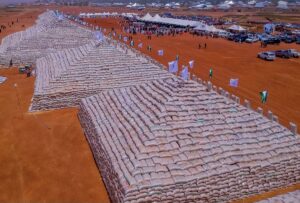Nestled in Nigeria’s northwestern region, Kebbi State is a hidden gem of agricultural opportunity. Its rich soils, abundant water resources, and favorable climate make it a promising destination for those interested in the agricultural sector.
With more than 80% of its population engaged in agriculture, Kebbi State’s identity is deeply intertwined with its agrarian roots. The state’s expansive agricultural lands, complemented by large water bodies and a suitable climate, create an environment ripe for diverse agricultural activities.
Kebbi State’s strategic vision focuses on optimizing its strengths. Emphasizing the cultivation of crops like rice, wheat, onions, sorghum, and more, the state aims to capitalize on its inherent agricultural advantages, offering growth opportunities for both itself and potential investors.
Emerging from the old Sokoto State in 1991, Kebbi State boasts a rich history reflected in its 21 local government areas. Home to a diverse population of 3,755,816, the state is a cultural tapestry, with various ethnic groups like Fulani, Hausa, Dakarkari, Kambarawa, and Dandawa contributing to its vibrant fabric.

Kebbi State’s climatic diversity adds intrigue to its agricultural landscape. Transitioning between Sudan Savannah in the north and Northern Guinea Savannah in the south, the state experiences distinct seasons. From the rainy period of April to October to the dry months of November to March, Kebbi State’s climate is an integral part of its agricultural story. Temperatures vary from a mild 23°C to a challenging 42°C.
With a vast land area spanning 37,698.69km², Kebbi State has significant room for agricultural expansion. Currently, only 36.46% of this land is under cultivation, leaving vast potential waiting to be unlocked. Approximately 420,000 hectares of Fadama land, including 170,000 hectares suitable for year-round irrigation, offer a promising canvas for agricultural growth. The state’s soils, including sundry, ferruginous tropical, hydromorphic, lateritic, and black cotton, tell stories of unique capabilities. Rivers like Niger, Kainji Lake, Rima, Zamfara, and Ka provide vital water resources.
Kebbi State has earned recognition as a major supplier of essential goods. It contributes rice, fish, groundnut oil, onions, and chilies to Nigeria’s South and Western regions. Infrastructure investments have improved connectivity between local government centers, markets, and processing facilities, strengthening the agricultural supply chain.
Looking forward, Kebbi State presents opportunities for further development. Infrastructure enhancement, research and development investments, and extension services can further unlock its agricultural potential. By incentivizing private sector engagement, the state could emerge as a prominent agricultural hub, fostering food security, employment opportunities, and economic growth.
In conclusion, Kebbi State’s agricultural story is one of untapped potential and promise. Whether as an investor or an observer, understanding its resources, vision, and growth prospects offers a glimpse into the state’s journey of transformation and prosperity.


